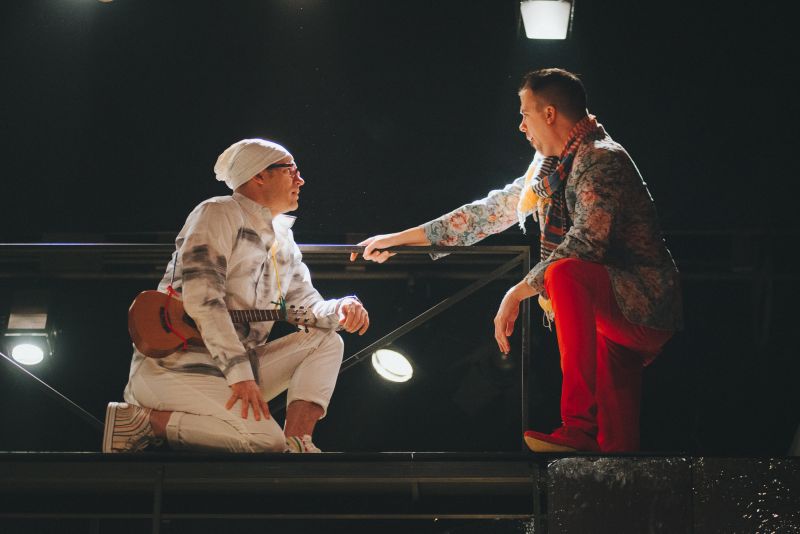Szigligeti Ede – Lakatos Róbert
Liliomfi
Musical comedy in 3 acts
Directed by Telihay Péter a.h.
Two theatre nomads tour Hungary. They are young, handsome, clever, talented and they love their life. They live a life full of adventures and love as often as possible. Thanks to their tour the spectators obtain the picture of life in Hungarian countryside: its traditions, uniqueness, battles, pleasure and troubles.
This musical comedy presents actors with freshness, pleasure and melancholy at the same time – like a man who, at the peak of his happiness, finds out that once everything will end.
„Comedy of the society“ – Szigligeti is writing and he is absolutely right. The main characters are Liliomfi and Szellemfi, the children of the time. They provoke and entertain people around them. They comfort them but also they reflect like a mirror everyone who is connected with them by destiny. They show two sides of a coin as a clown: the sad one and the happy one. Nowadays, to be an actor isn’t avstyle but an obsession. Joyfulness and regret are two sides of the obsession. There is someone standing at the seaside (Zampano or Szellemfi?), his features are fading away in the distance. Who was it? We don’t know. His footprints are still visible in the sand till the evening wind won’t be stronger…
This story is well-known today because of the death of Károl Makka a few days ago, one of the most successful producers. Thanks to the film, Liliomfi and Szellemfi have entered among the famous clown couples. The interesting fact is that Federico Fellini, a pope of Italian films, runs a film about the nomad artists – The Way at the same time.
Comic competitiveness but also fellowship between the lord and his servant represent a popular theme of art. Don Quijote and Sancho Panza or Don Giovanni and Leporello from Mozart’s opera reflect nicely this kind of relationship. Also Stan and Pan or Estragon and Vladimir from Waiting for Godot by Beckett. They are clumsy but pure and fair even if they get into trouble…
Cast
| Liliomfi | Madarász Máté |
| Szellemfi | Nádasdi Péter |
| Kamilla speaking | Varga Szilvia |
| Szilvai, black character | Vasvári Emese |
| Mariska speaking, she’s daughter if it’s true | Lax Judit |
| Erzsi Chaos | Rab Henrietta |
| Neighbour | Varga Lívia |
| Servant or something | Dégner Lilla |
| Kányai speaking | Bocsárszky Attila a.h. |
| Gyuri speaking, he’s in chaos | Ollé Erik |
| Schwartz sr. we don’t now where he’s from | Pólos Árpád |
| Schwartz jr. we don’t now where he’s from | Illés Oszkár |
| Miss at bar | Novák Éva a.h. |
Production team
Authors of musical poems and extracts: Arthur Rimbaud, Charles Baudelaire, Paul Verlaine, Petőfi Sándor, Jónás Tamás
Set: Telihay Péter a.h. feat. Király Adrienn a.h.
Costumes:Papp Janó a.h.
Accompanist: Dégner Lilla a.h.
Choreography: Kántor Kata
Dramaturgy: Artner Szilvia a.h.


